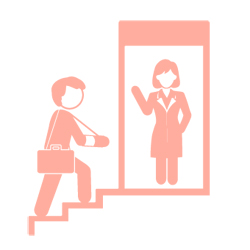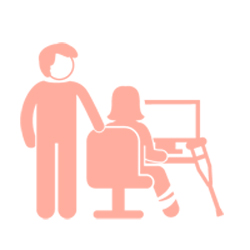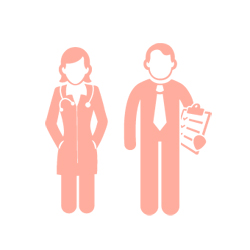Getting back to work
Working after your injury can help you get better quicker. It helps you get back to your usual activities and routines while you’re recovering.
See your doctor
Work can help you

People who keep working, even if they can’t do everything at first, get better quicker than people who take a long time off work.
Learn more about the 5 key benefits of recovering at work and how to get the best from your support team PDF, 152.73 KB
It’s never too early to start thinking about work. You don’t have to wait until you’ve completely recovered.
It's good for your recovery to stay active. You can improve your general fitness by getting up and going to work, and building on how much you do at work.
We know that:
- the longer you’re away from work, the harder it can be to get back to work
- taking a long time off work is bad for you socially, emotionally and physically
- work helps you stay active and is an important part of your recovery
- staying active helps to reduce pain
- being at work is an opportunity to connect with people and be part of a community
- working provides financial security
Supported recovery at work is achievable
Watch these videos for award-winning examples of how people returned to work and recovered at work.
- David was determined to return to work on the family farm after his work injury. In this video, David explains how he was supported in his recovery, the changes that enabled him to keep working on the farm, and his advice to others who are injured at work. View video
- Skye explains how work played an important role in her recovery after being injured in a car crash, and how her employer supported her return to work and wellbeing. View video
How to recover at work

Here are some strategies to help you recover at work:
- focus on what you can do, rather than what you can’t
- talk to your doctor and your employer about what you can do safely
- make a plan to get back to work if you are not working and get support from professionals if you need it
- stay in touch with your employer and the people you work with – there may be newsletters or updates they can send you, or meetings and training that you can go to while you recover
- ask questions if you are unsure or have concerns. Talk to someone who can support you, for example your doctor or your supervisor at work
- monitor your pain levels. Remember some increase in pain during activity does not mean that you are making things worse
Our recovery at work programs
SIRA has a number of programs that support recovery at work in the workers compensation scheme and the CTP scheme.
Recovery at work is about making small workplace adjustments that will help you continue to contribute at work while recovering.
Use our recovery@work toolkit which breaks the concept of recovery into two actions: talking, then planning. Give us your feedback to help inform the tool's ongoing development.
You can also contribute to our recovery at work programs by joining our reference group, which includes:
- people with lived experience of mental health recovery at work
- people working in and representing various industries
- people who live in different parts of NSW
- people of various ages, genders and cultural identities.
We're also funding a program called Recovery Boost, to inspire innovative solutions to improve recovery at work.
Grants of up to $50,000 are available to individuals and organisations with great ideas to create positive change.
Other support

Support is available to help you at work. Here are some people who can help:
- your doctor
- other health professionals involved in your rehabilitation, such as a physiotherapist, rehabilitation counsellor or occupational therapist
- your supervisor or manager, or the return to work coordinator at your workplace
Further information
Health Benefits of Good Work
The Australasian Faculty of Occupational & Environmental Medicine created an Australian and New Zealand consensus statement on the health benefits of good work.
Your Wellbeing and Recovery
Dr Adrian Medhurst provides practical tips on things you can do that may help your recovery.
